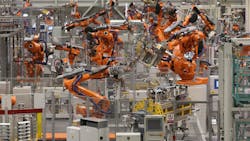Common Characteristics of the Factory of the Future
In Part 1 of our Factory of the Future series, we discussed the evolving definitions of the Factory of the Future, although there is not one universally accepted definition or term. In Part 2, we move on to the common characteristics of companies that have embraced new technologies.
Each manufacturer will approach the future from different directions, choosing different information technologies (IT) and operational technologies (OT) to solve their challenges and meet customer needs. There are, however, common characteristics that make a manufacturer more “future-ready” and able to fully embrace new opportunities.
Find the Latest Internet-of-Things News, Trends and Best Practices
Some common traits:
- Collaborative: Collaborative tools—and a willingness to share concepts—are important to being truly modern and innovative. Engaging with partners and customers to participate in product development as well as process improvement is important.
- Innovative: The company supports a culture of out-of-the-box thinking and encourages personnel—at all levels—to contribute ideas. This applies to new product introductions as well as internal processes and facilities management.
- Agile: The company makes decisions quickly and reacts in a timely manner to new opportunities or changes in market status.
- Cloud enabled: The company likely uses cloud solutions to take advantage of the many benefits such as always-modern capabilities, agility, and speed of implementation.
- Customer-centric: Today’s consumer, no matter the country or type of industry, is highly demanding and expects products and buying experiences that are highly personalized and tailored to individual needs.
- Vertically specialized: The trend to specialize in narrow niche markets and focus on a few core products continues to be a tactic for success.
- Data driven: The company makes decisions based on real-time facts, not outdated suppositions or guesses.
- Efficient: To remain competitive and profitable in a global economy, manufacturers must meet the heightened pressures to continually increase productivity, automate processes and operate with lean processes and minimal waste.
- Distinctive: Manufacturers must create and promote differentiating characteristics and be highly strategic in their positioning and product development. Standing out from the crowd is a necessity to maintain or gain market share.
- Automated: Pressures to modernize extend to the shop floor as well. Production systems and processes must be fully utilized with minimal downtime and wasted resources—of equipment and people.
How do you compare?
How many of these characteristics apply to your manufacturing plant? Now is the time to refine your strategy for moving toward being a Factory of the Future. This checklist of characteristics is a good place to start.
A recent report from analyst firm McKinsey, titled “Seven traits of an effective digital organization,” stresses that pressures to take action are reaching an urgent level. “To stay competitive, companies must stop experimenting with digital and commit to transforming themselves into full digital businesses …The age of experimentation with digital is over. In an often bleak landscape of slow economic recovery, digital continues to show healthy growth. E-commerce is growing at double-digit rates in the United States and most European countries, and it is booming across Asia. To take advantage of this momentum, companies need to move beyond experiments with digital and transform themselves into digital businesses.”
